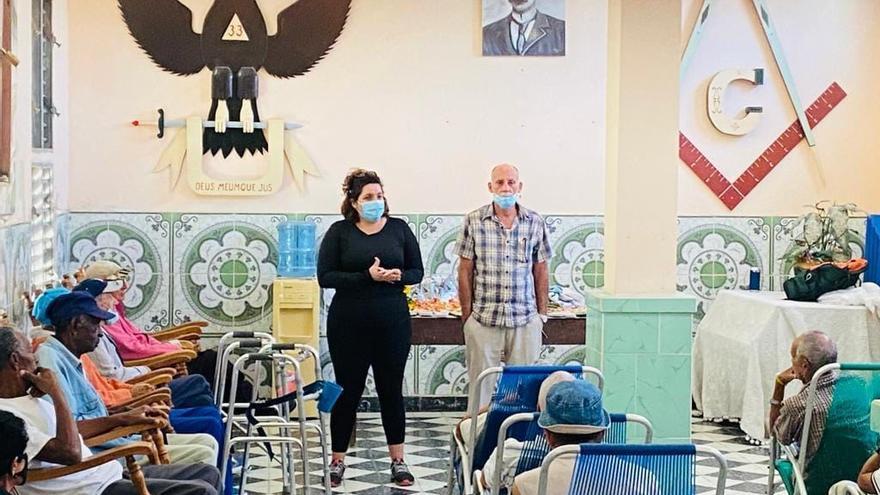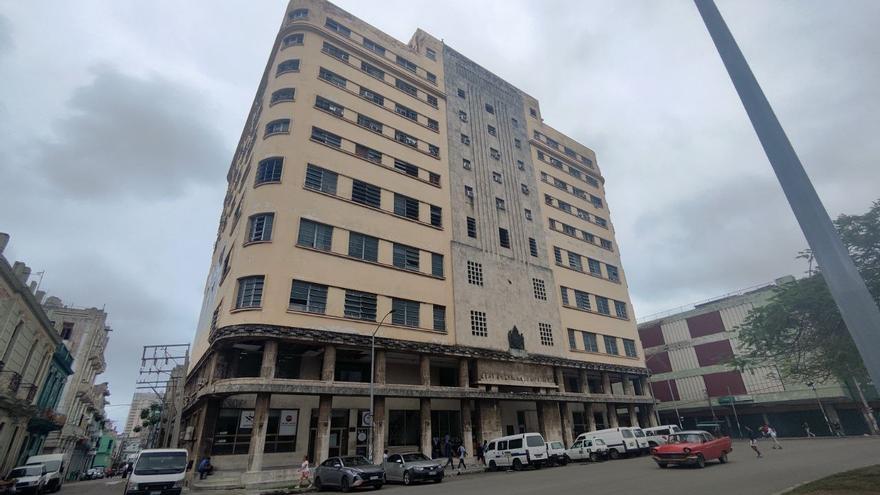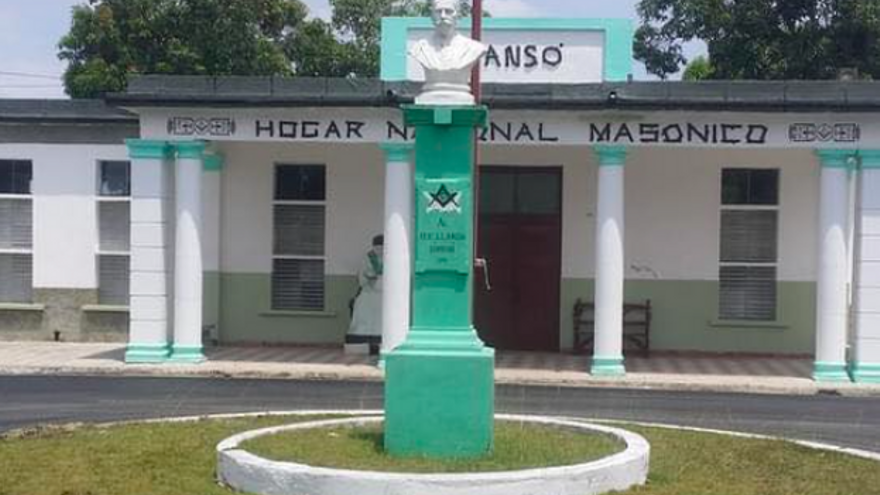
![]() 14ymedio, Havana, 17 January 2024 — After the theft of some $19,000 from his office, Grand Master Mario Alberto Urquía, leader of the Cuban Freemasons, has entrenched himself against those demanding his resignation. Measures to reinforce his authority have been drastic: he dismissed senior Masonic officials who questioned him and issued an urgent “call to order.” As the crisis progresses, hopes decline that the money will appear, money on which a large part of the maintenance of the elderly at the Llansó National Masonic Asylum, in the municipality of Arroyo Naranjo, depends.
14ymedio, Havana, 17 January 2024 — After the theft of some $19,000 from his office, Grand Master Mario Alberto Urquía, leader of the Cuban Freemasons, has entrenched himself against those demanding his resignation. Measures to reinforce his authority have been drastic: he dismissed senior Masonic officials who questioned him and issued an urgent “call to order.” As the crisis progresses, hopes decline that the money will appear, money on which a large part of the maintenance of the elderly at the Llansó National Masonic Asylum, in the municipality of Arroyo Naranjo, depends.
The writer Ángel Santiesteban Prats, a 33rd degree Mason – the highest step in the order’s hierarchy – and independent journalist, has been present in each phase of the process and agreed to detail it for 14ymedio. “The Board of Trustees had a sum of 21,000 dollars, between euros and dollars,” recalls Santiesteban, who is also one of the twelve members of the Board of Trustees of Llansó Asylum, the entity in charge of making decisions about the administration.
“The Grand Master says that I suggested it to him. That is not the case. I have consulted with other members of the Board of Trustees who do not recall that I had asked him to keep the money in the Grand Lodge. But he was one of the most concerned because the money was over there.” The writer describes the precariousness of the fence that leads to the “little house” of the Asylum where the money was kept. “I was obsessed with the possibility that someone would try to steal the money and hurt the workers.”
According to Santiesteban, in September 2023 Urquía took the money to the headquarters of the Grand Lodge, on Carlos III Street, Centro Habana. “At the Board of Trustees we questioned whether having that amount outside the bank was a crime. He answered no. The treasurer of the Grand Lodge, who is a lawyer, did a whole dissertation to prove that it was not illegal,” he explains.

The arguments for keeping the sum in the Carlos III building were clear: unlike the Asylum, it was a protected place – Santiesteban confirms this – and it had a safe. In October, during the monthly meeting of the Board of Trustees, Santiesteban himself proposed making a calculation between the treasurer of the Asylum and that of the Grand Lodge. “There we found out that the money was not held by the Grand Treasurer, but rather that Urquía was personally guarding it.”
Urquía kept the sum in unacceptable conditions: “a small box,” belonging to his own family, “which he later put on a shelf without any type of security” and which was going to be unprotected during the Grand Master’s vacation.
In January, due to State delays in distribution, the usual supplies for the elderly in the Llansó Asylum did not arrive. “There is an alarm on the 9th, and at 11:00 am the director of the Asylum calls the Sovereign [José Ramón Viñas Alonso], who presides over the Board of Trustees. The Sovereign responds that he will immediately go to the Grand Lodge to look for 1,000 dollars to buy food in a MSME and notifies Urquía.
Urquía’s response, from his office on the eleventh floor of the building, was that “the Grand Lodge elevator is broken.” And he offered to take the requested amount to the offices of the Supreme Council of the 33rd Degree – at number 164 Jovellar Street – where the Sovereign works. Viñas, on the other hand, said that he preferred to go with him and climb the stairs and thus, in the process, “count the cash,” says Santiesteban. Urquía resigned himself, but warned Viñas that he would be the one to call him when he was ready to receive him.
Urquía’s response, from his office on the eleventh floor of the building, was that “the Grand Lodge elevator is broken
He didn’t call him all day. At 7:00 pm, the Sovereign finally receives the notice from the Grand Master, who asked him to go to his house. There, Urquía admits that on Friday, January 5, he “discovered that he had been robbed.” When Viñas demanded an explanation for the fact that Urquía had promised to bring the $1,000 that the Llansó Asylum required, he alleged that he had done so “to avoid talking about the matter on the phone.”
“The Board of Trustees must be convened,” urged Viñas. The twelve members, including Santiesteban, decided that a report of the theft must be made. The meeting took place at 4:00 pm on Tuesday, January 9.
“We went to the Zanja Police Station and they didn’t help us until four in the morning,” says Santiesteban. When the investigating officer finally arrived, he snapped at them: “Don’t waste my time.” Santiesteban asked him if with that phrase he was suggesting the possibility that it was a self-theft. The policeman nodded.
During the investigation, he wanted to know more details about the keys and locks of the Grand Lodge. “Urquía then began to ’draw conclusions’, such as that other grandmasters had the same keys or that someone could have made a copy,” says Santiesteban, who highlights one point: the agent asked why it had taken him so long to report the theft. “The prints could have been there then, but by now they will have been erased,” the agent explained.

Urquía’s initial position was to admit responsibility – although not guilt – for his “negligence,” before the Board of Trustees and the Sovereign, he points out. “He said that he was going to replace the money, that they should give him until March.” Where he was going to get the stolen 19,000 from, Urquía did not say. The Grand Master, Santiesteban notes, is the owner of a MSME that is dedicated to construction.
“The Deputy Grand Master [Gerardo Cepero Díaz] and several officials asked for his resignation. They are not accusing him, at no point does the letter say that he stole the money. What they tell him is that he acted wrongly, and that his action has resulted in a negative image for the Grand Lodge. His reaction should be to resign, but he refuses.” In fact, he dismissed all those who signed the letter and sent them to the Masonic Court, “where they can be sanctioned or expelled,” says Santiesteban.
At the moment, the Board of Trustees is waiting for what the Police say, which – Santiesteban believes – will not be relevant. Cuban Freemasonry, he estimates, is going through its worst moment since Grand Master Manuel Collera Vento, who led the Cuban Freemasons in 2000, was revealed in 2011 as Agent Gerardo of State Security and a “valuable collaborator” of the regime, within the order since 1975.
The situation could be seen coming from the escape to the United States – via Mexico – of Urquía’s predecessor in office, Grand Master Francisco Javier Alfonso Vidal
In front of the world, “Cuban Freemasonry is in discredit,” laments Santiesteban. The situation could be seen coming from the escape to the United States – via Mexico – of Urquía’s predecessor in office, Grand Master Francisco Javier Alfonso Vidal. “He said that State Security pressured him to leave and that they wanted to force him to accuse Sovereign Viñas” for his criticism of the Government.
Viñas, in fact, is the common factor in the latest incidents that have disrupted the normal performance of the fraternity. After the massive protests of July 11, 2021, the Sovereign wrote a letter in which he rebuked the Government and asked for the resignation of Miguel Díaz-Canel, for instigating a civil war. “They do not forgive him. He has become a ‘counterrevolutionary’. They have detained him at the airport, State Security summons him to both Villa Marista – his headquarters – and to police stations, they visit him at his home,” Santiesteban lists. This newspaper has contacted Viñas, who has preferred “not to answer questions about the institution,” alleging his usual discretion regarding internal Masonic matters.
The theft, the pressure, the escapes, the infiltrations for decades, are symptoms of the same – and very old – objective, according to the writer: “State Security has always opted to weaken Cuban Freemasonry.”
____________
COLLABORATE WITH OUR WORK: The 14ymedio team is committed to practicing serious journalism that reflects Cuba’s reality in all its depth. Thank you for joining us on this long journey. We invite you to continue supporting us by becoming a member of 14ymedio now. Together we can continue transforming journalism in Cuba.
